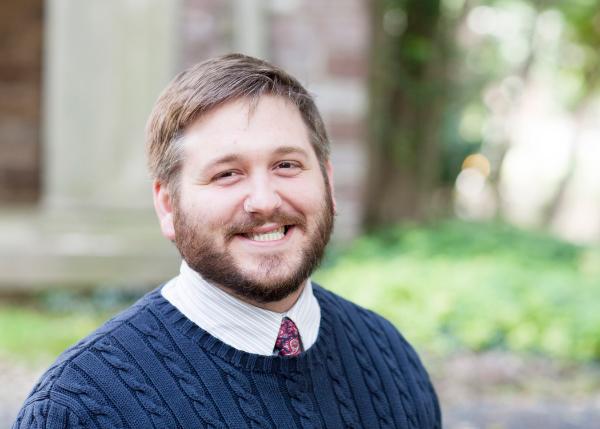St. Thomas adjunct professor Ry Siggelkow made a commitment to himself to include black theology within the curriculum of all of his theology classes.
For the first time this spring semester, Siggelkow had the opportunity to teach Theology 432: Black Religious Experience. This class fully allowed him to focus on educating students on Christian theology written by African American theologians, in comparison to the theology typically covered in classes written by white theologians.
Events such as the non-indictment of the police officer who killed Michael Brown or the Jamar Clark shooting in North Minneapolis lead Sigglekow to decide that his personal way of thinking about God and theology had to change.

Then in the fall of 2015, former St. Thomas students were involved in a shooting of five protesters outside the 4th Precinct in Minneapolis. The protesters had been demonstrating against the the police shooting of Jamar Clark.
Seeing former St. Thomas students participation in such an event served as a call to action to Siggelkow to make a change in his way of teaching.
“Something really switched in me, something really changed in me at a fundamental level,” Siggelkow said. “I can’t really describe it, other than it was a kind of a revelation to me.”
Siggelkow said he remembered running to the department chair upon hearing of the shooting, saying how he found the fact that St. Thomas students could be required to take three theology courses and leave the institution as white supremacists to be a huge problem.
Throughout Siggelkow’s years in school, his interest in studying black theology grew as he realized how majority of his various schooling was shaped by classic texts of the Christian Theologian Tradition that lacked the inclusion of black theologians.
“Whether they’re German or French or Italian thinkers,” Siggelkow said. “You have predominantly European theologians sort of dominating what counts as canonical voices.”
Throughout his studies, he found it interesting that black theology was frequently taught as “contextual theology,” or from a particular context/rooted in a particular experience, in contrast to what his classes were considering “normal theology.”
“[Normal theology], I began to think, is basically just Europeans,” Siggelkow said, “as if that too isn’t a kind of contextual theology, a theology that comes from somewhere.”
This idea troubled Siggelkow. While he was taught some black theology, Latin American liberation theology, or feminist theology, it was evident to him that these styles of theology were being taught as more of secondary ideas to the theology they mainly focused on in class.
He began to read black theology written over the past couple hundred years during his free time to further educate himself, in hopes to correct his under-exposure to black theological texts so he could correct this problem for his students as well.
Junior Mark Holliday, a student in Siggelkow’s Black Religious Experience class, decided to take the course looking for more exposure to black theology.
“I grew up going to a Catholic school where there weren’t a ton of African Americans in my class. I felt that I was sort of sheltered,” Holliday said. “Taking this class exposed me to lots of diverse ideas that I would have lacked exposure to otherwise.”
Holliday had taken Sigglekow’s Theology 380: Grace, Hope and Eschatology and found himself intrigued by “Hope in the Holler,” a book they read in class written by Lisa Lewis Tyre, about black female slave narratives. His interest in this book motivated him to want to learn more about black theology and take Siggelkow’s Black Religious Experience.
Senior Tate Simmons, also a student in Siggelkow’s Black Religious Experience had similar feelings about his lack of black theology knowledge coming into the class.
Growing up going to Minnetonka Public Schools in Minnesota, Simmons said he never had an African American teacher and wasn’t surrounded by many African American peers either. In his Lutheran church, they barely read any black theology texts.
“I’ve gained a different perspective on not just theology, but life in general,” Simmons said. “Whether we’re talking about slavery or the civil rights movement, that’s not something that you hear a lot about in white theology.”
Simmons has found that the main difference between white theologians and black theologians from the texts read in class has been the idea of oppression.
“It has definitely been humbling to hear and read about these topics,” Simmons said.
In 2006 Siggelkow earned a Bachelor of Arts in theology at St. Thomas, where he then began working as a theology tutor and research assistant from 2007 to 2009, while earning his Masters from the St. Paul Seminary School of Divinity in 2009.
He worked as an adjunct professor at the university for St. Thomas from 2009 to 2011, then took a leave to earn his Ph.D. in Theology from Princeton Theological Seminary. He returned to St. Thomas as an adjunct in 2014 and is currently a pastor at Faith Mennonite Church in Minneapolis as well.
At St. Thomas he has taught Theology 101: Christian Theological Tradition, Theology 200: Christian Belief: Ancient and Contemporary, and Theology 380: Grace, Hope and Eschatology. He said Theology 432: Black Religious Experience this semester has been his favorite course to teach at St Thomas so far.
While Siggelkow isn’t aware of the next time he will be teaching this course, he said he hopes the opportunity arises again.
Although it may not specifically be through Theology 432: Black Religious Experience, St. Thomas students can still plan to be educated on black theological tradition and anti-black racism in any of Siggelkow’s classes they find themselves in for upcoming semesters.
Taylor Shupe can be contacted at shup9397@stthomas.edu


